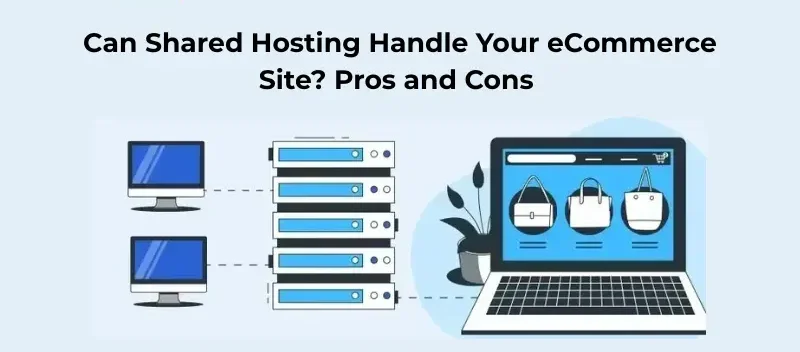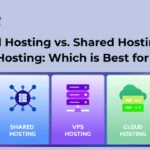In a digital world, starting your e-commerce venture is like opening doors for a global audience. Initially, many founders focused more on product curation, an intuitive user interface, and product branding. These elements form the core of the business, but real strength comes when these activities are combined with data-backed strategies and conversion optimization. In this context, we talked about the pros and cons of shared hosting for eCommerce.
While UI design and SEO often get appreciated, one back-end component plays a crucial role in the seamless functioning of your online business: an e-commerce site hosting solution.
For any business, a highly reliable hosting setup ensures fast-loading pages, top-tier security, and flexible scaling options whenever the need arises to upgrade. Shared hosting is the most popular choice for small businesses looking to save budget for other business activities. However, such low-cost solutions could affect your business success in the long run.
In this blog post, we’ll discuss the pros and cons of shared hosting to find if it’s the ideal solution. While leading platforms often include the best e-commerce website builder solutions as a part of their service, the story gets more complex if you’re relying on WordPress or handling everything on your own.
Breaking Down What Shared Hosting Is?
Before unfolding the proven pros and cons, let’s get a clear picture of what shared hosting is. In a shared hosting framework, hosting is like renting a space in a digital apartment building. You host a website on a server where other sites have already allocated the space. In this hosting, every website in the network shares the RAM, processing power, and other common pool of resources. It emerges as a budget-friendly option for many, but it could lead to potential risks if a server is hit with sudden traffic spikes.
In today’s digital-driven world, running an e-commerce business is far more than launching a website and selling products right away. Your store needs a robust foundation that allows seamless website operations around the clock. While shared hosting helps you with an easy start, the real question lies in whether it can scale with a growing e-commerce business.
Here’s the catch with the basic shared hosting solution like WordPress: your website shares common space and resources, which leads to a burden on the server.
The Pros of Shared Hosting for eCommerce Businesses
Beginner-Friendly Low-Cost Hosting
For new e-commerce businesses, keeping costs low can be a great strategy. Some basic plans of this hosting cost a few bucks a month, allowing owners to keep overhead low while building a customer base.
For entrepreneurs in the early stages of lean testing, it’s an ideal and affordable way to get started while gathering real-world insights.
Simple Setup to Go Online in Minutes
Setting up a website for your e-commerce business doesn’t need the support of tech experts. It simplifies the website launch process for non-tech-savvy entrepreneurs. E-commerce businesses can focus more on product development and marketing without worrying about back-end complexities.
It covers all that you need to run an online business with limited technical resources. Along with a basic hosting setup, leading hosting providers offer free SSL certificates and easy-to-handle dashboards.
Works Well for Light Website Loads
If you’re starting with your e-commerce venture, shared hosting is a stable option to fulfill your requirements. If your product list is limited and your website witnesses less transaction load, it’ll ensure the smooth functioning of your operations without a glitch.
This approach provides a financial cushion for emerging e-commerce brands, allowing early businesses to gain early momentum by trying different strategies.
Know the Hidden Cons of Shared Hosting
Performance Constraints to Watch For
Here’s the catch with the basic shared hosting solution: your website shares common space and resources, which leads to a burden on the server. The performance of your website may degrade because hundreds of websites rely on the same server for CPU and bandwidth as your site.
In a competitive digital world, online shoppers expect quick-loading pages, not more than a few seconds. If your e-commerce site struggles to load promptly, people abandon carts and prefer your competitors for a seamless experience.
Also Read
Potential Security Vulnerabilities
Data security is no longer an additional feature for a website but a necessity for ensuring the proper protection of sensitive customer information and financial records. Good e-commerce site hosting implements robust security protocols, but the scope of challenges popping up is higher in shared hosting.
A single cyberattack can lead to a major setback for your e-commerce website. It can damage the brand’s reputation and wipe out years of revenue for your business. Shared hosting, due to its limited features, may leave your store exposed to cyber threats.
Scaling Challenges with the Shared Hosting Model
An e-commerce website may struggle during sudden traffic spikes if built on shared hosting. For an e-commerce site, limited-time offers and seasonal sales are key events to boost sales and generate higher revenues. The inability of shared hosting to match the scale can result in slow performance and shake customer trust.
Nothing halts momentum when a website struggles to keep up with the pace. With limited resources of shared hosting, a site operation may experience a performance throttle or temporary suspension.
Conclusion
Your hosting solution is the main engine behind every single click and purchase on your e-commerce website. A shared hosting solution may appear to be an ideal starting point, but when viral traffic hits the website, it can hold back your business.
Are you planning to start your business journey with a basic hosting solution? You can launch a website with shared hosting to get a steady start for your business. Just keep a close watch on how your e-commerce platform evolves when product sales start rolling in bulk. Plan to move to the next version of hosting once demand increases. You can partner with renowned hosting providers, like hostbd.us, that offer the best e-commerce website builder to make your journey easy.





